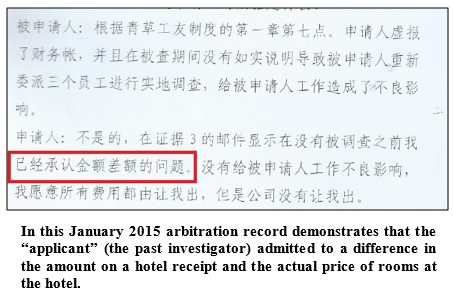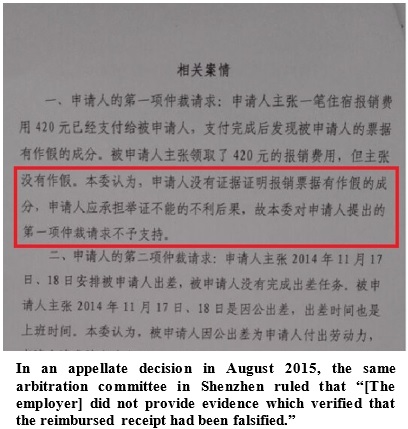On November 20, 2015, Huizhou-based Dongjiang Times published a story titled “CLW exposed by former employee; fired without reason, falsified report suspected”. The news report claimed that CLW’s report on child labor at HEG Technology contained false information. CLW believes that this accusation lacks evidence. In regards to this, CLW presents the following information:
First, China Labor Watch (CLW) was sued by Samsung’s supplier factory HEG Technology in 2014, a case that is still in progress. The HEG factory is located in Huizhou, which is home to more Samsung suppliers than any other region in China. The Dongjiang Times, a media organization based in Huizhou, is owned by the Propaganda Department of the Huizhou City Chinese Communist Party Committee and the Office of the External Affairs Leading Group of the Huizhou City Chinese Communist Party Committee and managed by the Huizhou News Media Group.
Second, in October 2014, HEG sued CLW and its Executive Director Li Qiang for defamation tied to CLW’s expose on child labor being employed at HEG. The lawsuit was filed in a Huizhou court and is still ongoing. CLW and its executive director are located in the United States, so the case should not be under Huizhou’s jurisdiction. But the Huizhou court decided against CLW’s dispute over jurisdiction based on erroneous information. For example, to establish that Li Qiang was under the jurisdiction of Huizhou, the court used the address and ID of another person named Li Qiang in Huizhou whose personal information was completely different from that of CLW’s Executive Director. The ruling is unfair, but CLW will continue to fight the case.
Decision of Huizhou court regarding challenge to jurisdiction.
The text framed in red displays information that has no relation to the defendants CLW and Li
Third, on December 25, 2014, CLW’s partner organization in China fired an employee who investigated HEG Technology in November 2014. But he was not fired for refusing to write fake allegations, as stated by the Dongjiang Times story. The investigative report turned in by the investigator in November 2014 contained factual errors. Subsequently, a regular internal financial audit revealed a suspicious hotel receipt submitted by this investigator for the HEG investigation. Two local staff members traveled to the hotel in question, confirming that the receipt was in fact falsified. When asked to explain the investigative and financial issues, many of the employee’s justifications were unclear. During the course of above events, the employee admitted to falsifying the receipt. On the grounds of investigative and financial dishonesty, the organization fired this employee.
After the termination, the investigator filed a complaint with the local labor department. Despite the investigator admitting to providing a falsified receipt, the arbitration and appellate arbitration proceedings resulted in a decision requiring CLW’s partner organization to pay the investigator compensation and an annual bonus. In the process of arbitration, the investigator admitted to falsifying a receipt, but the in an appellate decision months later from the same arbitration committee, the committee denied that there was any evidence of a falsified receipt (see images below). There is therefore a contradiction between the record and the decision. While CLW believed that the arbitration ruling was unjust, we demanded the local partner organization pay all of the compensation to the past employee under the committee’s money judgment. This payment was made back in September 2015.


In June 2015, an investigator sent into HEG undercover by CLW’s partner organization was discovered, and only two days later another partner office was investigated by more than ten Shenzhen labor inspectors and police officers, who confiscated documents based on suspicion of “illegal employment”, as described in the beginning of this section.
“Confiscation decision” issued by Shenzhen police
Fourth, a recent report from the Huizhou-based Dongjiang Times claims, based on an interview with the investigator in question (who used the alias Zhou Xiaoming), that an investigative report published by CLW on December 3 about the employment of child labor at HEG Technology was connected to Zhou Xiaoming’s investigative work while at CLW. But this is a mistake. The December 3 report was a result of the work of another CLW partner group, unconnected to Xiaoming’s investigation. After the December 3 investigation was completed, another investigator even traveled with IDG journalist Michael Kan to Chengdu to interview past student employees of HEG Technology. He did not go to HEG’s facility itself to investigate. (Kan’s subsequent report can be read here.)
The investigator who was fired never independently completed an investigation while employed at CLW’s partner organization, with the exception of the report on HEG that he was assigned to write but which CLW choose not to use. CLW has therefore never published the findings of any investigation completed by this person.
Before publishing any report, CLW carried out a stringent verification process. We only publish information that is confirmed by multiple sources. HEG’s lawsuit against CLW is a clear case of a manufacturer uniting with the local government to suppress an NGO’s investigative and advocacy work.
CLW calls on multinational companies to improve working conditions in their supply chains if they hope to reduce negative attention. They should not use the denial of facts and suppression to reduce monitoring of supplier factories.